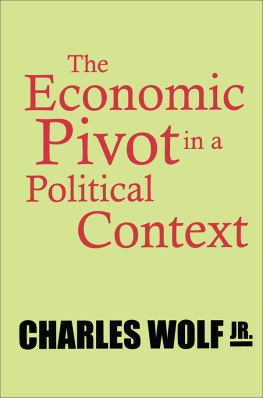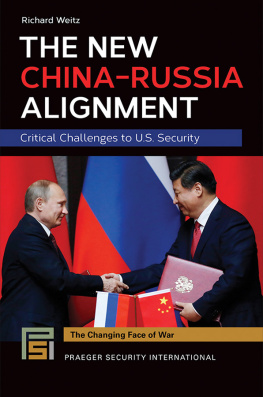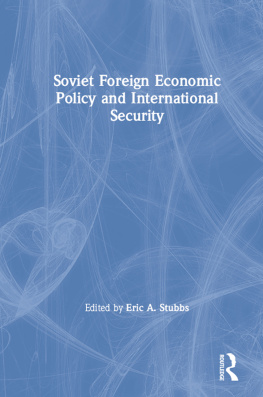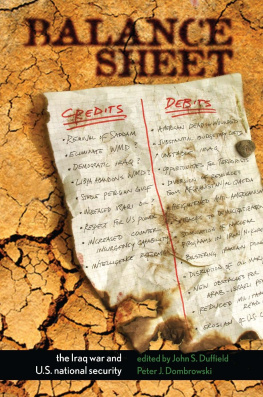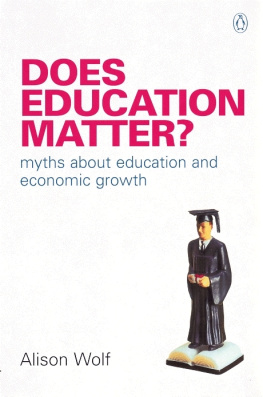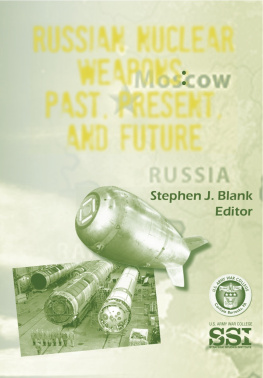The Hoover Institution on War, Revolution and Peace, founded at Stanford University in 1919 by Herbert Hoover, who went on to become the thirty-first president of the United States, is an interdisciplinary research center for advanced study on domestic and international affairs. The views expressed in its publications are entirely those of the authors and do not necessarily reflect the views of the staff, officers, or Board of Overseers of the Hoover Institution.
www.hoover.org
Hoover Institution Press Publication No. 560
Hoover Institution at Leland Stanford Junior University,
Stanford, California, 94305-6010
Copyright 2008 by the Board of Trustees of the
Leland Stanford Junior University
All rights reserved. No part of this publication may be reproduced, stored in a retrieval system, or transmitted in any form or by any means, electronic, mechanical, photocopying, recording, or otherwise, without written permission of the publisher and copyright holders.
First printing 2008
15 14 13 12 11 10 09 08 9 8 7 6 5 4 3 2 1
Manufactured in the United States of America
The paper used in this publication meets the minimum requirements of the American National Standard for Information SciencesPermanence of Paper for Printed Library Materials, ANSI/NISO Z39.48-1992.

Library of Congress Cataloging-in-Publication Data
Wolf, Charles, 1924
Looking backward and forward : policy issues in the
twenty-first century/by Charles Wolf Jr.
p. cm. (Hoover Institution Press publication; no. 560)
Includes bibliographical references and index.
ISBN-13: 978-0-8179-4871-9 (cloth: alk. paper)
ISBN-13: 978-0-8179-4872-6 (pbk: alk. paper)
1. Economic policy. 2. Foreign economic relations. 3. Foreign relations. I. Title.
HD87.W65 2008
330.9dc22 2007030582
ISBN 978-0-8179-4873-3 (electronic)
Foreword
How many times have you read an op-ed in the newspaper that changed the way you think? Most of us would answer, not very often. But if you were lucky enough to read an essay by Charlie Wolf in the Wall Street Journal, the Los Angeles Times, or the International Herald Tribune (or other major publications) in the last few years, your perspective was enlarged and your thinking was enriched.
This is the third collection of Charlie's essays, following two successful publications in 1991 (Linking Economic and Foreign Policy) and 1997 (The Economic Pivot in a Political Context), published by Transaction Publishers. It has been my privilege to contribute the Foreword to all three, probably because it was at my urging years ago that Charlie publish his work outside RAND, where I first met him. These twenty-five essays were written between 2002 and 2007 and, like good wine, are getting better as he ages.
With his global perspective, Charlie explains such mysteries as Chinese-style capitalism, Japan's relationship with North Korea, what if Iraq had not been invaded, and how to improve public diplomacy. My own favorite is the last essay in this book, Liberals and Conservatives: Who's What and Where? in which Charlie observes that the policy orientations associated with liberals and conservatives in American politics are the precise opposites of what the labels stand for in the rest of the world. Think that one over.
A fine mind coupled with clear writing skills is a treasure. Readers of Charlie Wolf's latest work will find rich rewards indeed.
Newton N. Minow
Preface
The twenty-five essays in this book were written between 2002 and early 2007. With a few exceptions, they were published in the Wall Street Journal, the Wall Street Journal Asia, the Wall Street Journal Europe, the Los Angeles Times, the International Herald Tribune, the South China Morning Post, the Japan Times, the International Economy, Policy Review, and the Milken Institute Review. The unpublished essays were presented as dinner talks or were circulated privately. One of the essays, Public Diplomacy (, pages 121148), was coauthored with Brian Rosen. All of the essays are collected in this book in the hope that the whole may exceed the value of the scattered individual chapters. All of the essays are printed as originally written with only light editing by the Hoover Press.
Toward this end and to make their disparate content cohere somewhat more closely, I've divided the chapters into five sections dealing, respectively, with China (chapters ).
The subjects dealt with in these geographic areas span or at least touch on a wide range of economic, political, security, and diplomatic issues. The stance generally adopted in each essay is to consider a then-current issuewhether in China or Japan or Iraq or Russiafrom the standpoint of its precursor context and its prospective consequences, hence, the Looking Backward and Forward of the book's title.
A few themes, often contrary to conventional wisdom, emerge for the reader's consideration and perhaps disputation. For example, I suggest that, under not implausible circumstances, rapid and full convertibility of China's currency might lead to its depreciation rather than appreciation; that China's remarkable economic performance is both likely to be sustained and to confront enormous and possibly disruptive impediments in its efforts to do so; that unilateralism in U.S. national security policy may sometimes be preferable to multilateralism; that, despite presumptions to the contrary, the United States is as or more disposed to favor multilateralism than are many other countries; that the erroneous expectation that Iraq possessed nuclear weapons does not imply that the prior intelligence leading to this expectation was flawed; that U.S. coalition partners may have interests and behaviors more congruent with those of the United States than do putative U.S. allies; and that the ability of the U.S. economy to adjust to a reduction of its chronic current account deficits may exceed the ability of countries such as China and Japan to adjust to reductions in their chronic current account surpluses.
The variety and complexity of these themes, as well as their common characteristic of spilling over the standard boundaries of political, economic, and military affairs, will be the typical pattern associated with policy issues in the twenty-first centuryhence, the book's subtitle.
I have always felt that commentatorswhether they be the regular hired columnists of the major news media or the occasional, often more academically credentialed volunteersshould be held to account for the accuracy of their pronouncements. Without jeopardy to First Amendment sensibilities, such accountability might be provided by some type of scoring system devised by outsiders or even by the authors themselves. Although, in the latter case of author judgment, the possibility of a culprit serving as his own juror might lead readers to doubt the objectivity of the results, even the subjective ex post assessment would discourage hyperbole before the fact and encourage responsibility afterward.
With this aim in mind, I have added a brief Postaudit at the end of each essay indicating whether, in my judgment, the argument set forth is currently valid and relevant, compared with when it was written. In my perhaps biased assessment, nineteen of the essays stand up to this test quite well (each receiving an A or A-), four do passably well (receiving Bs), and one doesn't make the cut (receiving a C). Of course, the reader is welcome to make her own independent assessment, as well!


